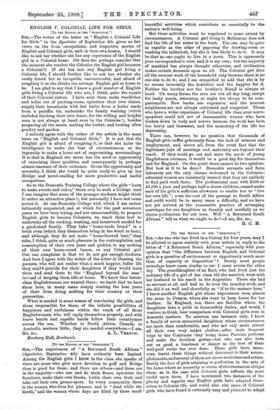[TO THE EDITOR 07 THE "SPECTATOR. "] SIR, — The experiences of "A
Returned South African" (Spectator, September 4th) have evidently been limited. Among the English girls I know in the class she speaks of there are some who give more devotion to golf and Bridge than is good for them ; and there are others—and these are in the majority—who can and do stain floors, upholster the furniture, make their own frocks, bottle their own fruit, and take out their own grease-spots. In every community there is the woman who lives for pleasure and is " dead while she liveth," and the woman whose days are filled by those small
beautiful activities which contribute so essentially to the nation's well-being.
But these activities must be regulated to some extent by circumstances. A Colonial girl living in Melbourne does not lead the life of her sister in the hush. The one may be quite as capable as the other of papering the drawing-room or washing the tablecloth, but she is less likely to do it. It may be that no one ought to live in a town. This is apparently your correspondent's view, and it is my own; but the majority of mankind has always thought otherwise, and civilisation makes certain demands upon us all. The Colonial girl does all the manual work of the household only because there is no one else to do it; and I am compelled to add that she is by no means invariably the healthier and the happier for it, Neither the brother nor the brother's friend is always at hand. On many farms the men are out all day long, except for hasty meals, returning at night too sleepy to be com- panionable. New books are expensive, and the nearest neighbours are not always cultivated and congenial. Those who have a wider experience of Colonial life than your corre- spondent could tell her of innumerable women who have broken down in body and nerves because the work has been too heavy and incessant, and the monotony of the life too depressing.
There can, however, be no question that thousands of English girls suffer grievously from the lack of interest and employment, and, above all, from the cruel fact that the legitimate joys of marriage and maternity are beyond their reach. If they could go out and meet the needs of young Englishmen overseas, it would be a good day for themselves and for England. On this point there cannot be two opinions. But how is it to be done ? Domestic servants and farm labourers are the only classes welcomed in the Colonies ; educated women are insistently warned that they are unlikely to find paid work there. The professional man with R500 or £1,000 a year, and perhaps half-a-dozen children, cannot make each of his girls a sufficient allowance to enable her to " live her own life "; even the cost of the passage to South Africa and outfit would be in many cases a difficulty, and we have not yet arrived at the reasonable practice of arranging marriages for our daughters as frankly and carefully as we choose professions for our sons. Will " A Returned South African " tell us what we ought to do ?—I am, Sir, &c., H. C. M.










































 Previous page
Previous page